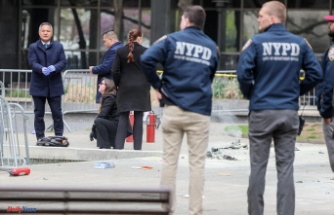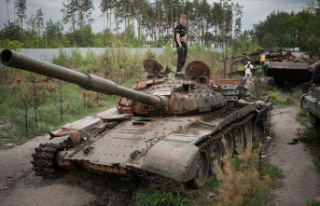Two people were killed in an attack by Russia on a Ukrainian market. Residents were told to evacuate Slovyansk, Ukraine's eastern city.
As Russian forces advanced from the north, civilians boarded minibuses Wednesday morning.
Mayor Vadym Liakh stated that "we take people out every single day" and that "about 23,000 residents are still there". Many of the evacuatees were transported by bus to Dnipro, further west.
He stated that the city, which was home to over 100,000 people before, is now "well fortified."
The Russian forces have taken control of the Luhansk region. UK defense intelligence suggests that Slovyansk will be the next target in the fight for Donbas. This industrial area consists of Luhansk, Donetsk, and Luhansk.
Russian forces continued to shell Mykolaiv in the south, where Ukraine is preventing an advance on Odesa.
You can read the entire story here.
After a missile strike on Kyiv killed Ekaterina Volkova, a Russian-born woman, and injured her husband in Ukraine, a Russian-Ukrainian couple was irreparably divided.
BBC spoke with their family members, who condemned the strike at an apartment block. Ekaterina and Zhenya, her daughter, were pulled out of the rubble. Oleksiy, however, died leaving behind a devastated family.
Iryna Venediktova is the Ukraine's general prosecutor. She told the BBC that she is investigating over 21,000 war crimes and aggressions allegedly committed by Russia since the invasion.
Many trials would need to be held in absentia, she acknowledged. She said that despite this, Russian militaries that had decided to kill civilians and torture civilians to rape them should realize that it's just a matter of time before they all appear in court.
She stated that she received reports about 200-300 war crimes per day.
International condemnation has been given to Russian attacks on civilian areas. As well as Ukrainian journalists and aid workers, foreign journalists as well as Ukrainians have reported atrocities committed by Russian troops, including the indiscriminate bombardment of apartment blocks. Russia denies that it targeted civilians and accuses Ukraine for staging "provocations."
A Russian court ordered that Kazakh oil exports to Western countries be suspended for one month.
Russia manages the Black Sea oil terminal in Novorossiisk. Here, tankers load up with oil from the Tengiz fields in Kazakhstan via pipeline.
Caspian Pipeline Consortium, (CPC), operates the pipeline. The CPC is appealing against the ruling. The court found that there were "documentary violations" in CPC's oil spillage response plan.
Many oil companies from the West, such as Chevron or Mobil, have stakes in CPC.
Russia has been restricted in its oil and gas exports due to Western sanctions. Kazakhstan producers are therefore much in demand.
According to the EU Commission, Kazakhstan accounted for 6% of EU oil imports in 2020 and Russia for 29%. The CPC is responsible for 80% of Kazakh oil exports from Europe.
Kazakh President Kassym Jomart Tokayev publicly rejected to recognize the Donetsk, Luhansk "people’s republics” declared by Russia in eastern Ukraine.
He also suggested that Kazakhstan could increase its oil exports for the EU.
Latvia will reintroduce its national military service that was scrapped in 2007. It will be voluntary for five years, then it will become compulsory after that - a system similar with Sweden's.
Artis Pabriks, Defence Minister, announced the move to bring Latvia in line with its Baltic neighbors Estonia, Lithuania, and Finland. These countries have military conscription.
For 11 months, men aged 18 to 27 will be recruited and pay up to EUR400 (PS342 or $408) per month. They will be able to become military reservists through their service. Women will continue to serve in voluntary capacity.
Latvia is a member of the EU and NATO and has 7,500 soldiers and National Guards. They are backed by 1,500 Nato troops. It is hoped to train an additional 7,000 conscripts each year.
"The more people who have military training, the less likely Russia will want its military aggression against Latvia," Mr. Pabriks tweeted.
Latvia is home to approximately 1.8 million people, 25% of which are Russian-educated.












